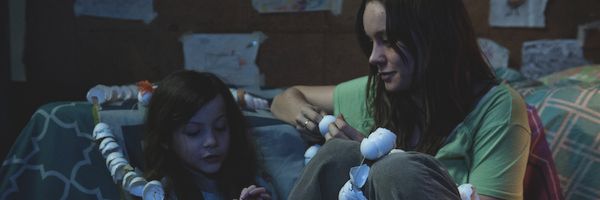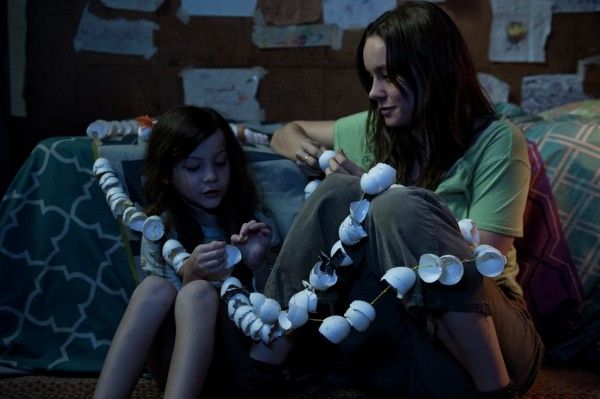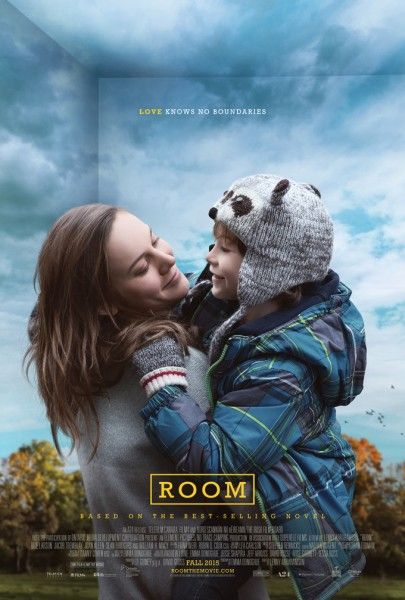Room exists in two places with two people, and it tries to find life in between. Although the film can be an emotional powerhouse at certain points, director Lenny Abrahamson’s attempt to tie everything together with a tale of emotional discovery leaves parts of the story feeling oddly cold and detached. The only aspect that’s consistently impressive is the lead performances from Brie Larson and Jacob Tremblay, who provide the film with the majority of its emotional complexity and wonder.
Five-year-old Jack (Tremblay) and his Ma (Larson) live in “Room”, which Jack believes is the entirety of the world. For him, it’s vast and diverse, and while he has a vague understanding of something beyond his walls, Ma has gone to great lengths to shield them from the reality of their situation: they’re prisoners in a backyard shed belonging to “Old Nick” (Sean Bridgers), who kidnapped Ma when she was a teenager. When they’re able to finally escape, Jack and Ma and must acclimate to a much larger world.
Abrahamson has an intertwined story, but he wants to tell it chronologically. He wants to keep the audience in Jack’s POV, but he also wants the raw, harsh reality of Ma’s situation. These are two vastly different viewpoints, and Abrahamson tries to have them both, which isn’t necessarily out of the realm of possibility. Telling the story only from Jack’s perspective could have been too mawkish and telling it only from Ma’s could have been too dark. It’s a tricky balancing act, and Room always feels like it’s wobbling.
When it clicks, the film works beautifully. Abrahmson’s camera work does an excellent job putting us in Jack’s shoes. We see things from low angles; the world seems big, a little scary, and a little curious. We also get narration from Jack that further defines how he perceives the world, and it feels like we’re part of an awakening. It borders dangerously close to overbearing precociousness, and it’s only the true darkness of Jack and Ma’s circumstances that make his perspective feel like a necessary coping mechanism rather than a contrived narrative device.
And yet the way it’s integrated makes the film feel off-balance. Room needs both halves—Jack and Ma, inside and outside—but it results in stretches where the film struggles to find an emotional connection until suddenly it hits you with a moment where you think you might start bawling. I’m not sure if Abrahamson played around with chronology when he was editing the film, but it feels like jumping around in time rather than telling the story chronologically could have helped with the pacing.
Thankfully, he always has Larson and Tremblay, who give two of the year’s best performances. They have to carry an immense emotional range for characters dealing with twisted circumstances, and sell us on a mother-son relationship that is both lived-in and yet needs to break apart in some ways as they cope with the outside world. For Jack, the world is new; for Ma, it’s a world that forgot her. These are tough characters, and Larson and Tremblay are astounding from start to finish. They’re the film’s emotional core, and it’s an absolute joy to watch them.
Room is a film that’s good and yet it’s frustrating to watch it flirt with greatness so often but never consistently hit its emotional mark beyond the strength of its two leads. What the film has to say about discovering the world, and innocence and experience, gets lost in pacing issues and trying to find the right framing for the narrative. Like Jack and Ma looking through their skylight, we know there’s a big, bold, beautiful, complex world out there. It’s so close, yet so far away.
Rating: B-
Click here for all of our TIFF 2015 coverage thus far or peruse links to our reviews below:
- 45 Years
- Anomalisa
- Baskin
- Black Mass
- The Danish Girl
- The Devil’s Candy
- Dheepan
- Equals
- February
- Green Room
- Hardcore
- Hitchcock/Truffaut
- I Smile Back
- The Iron Giant: Signature Edition
- Kill Your Friends
- Legend
- The Lobster
- Love
- The Martian
- Sicario
- Spotlight
- Trumbo
- Victoria
- Where to Invade Next



